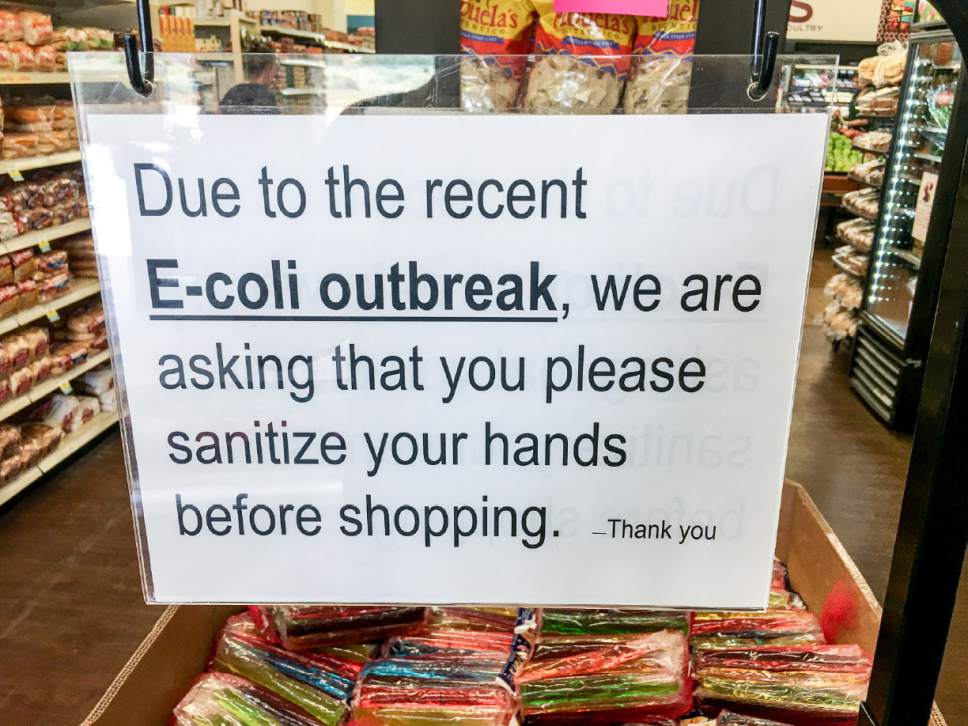This is an archived article that was published on sltrib.com in 2017, and information in the article may be outdated. It is provided only for personal research purposes and may not be reprinted.
Infected animals are the likely cause of an E. coli outbreak that killed two children and sickened 10 others recently in Hildale, Utah, and adjoining Arizona communities, health officials said Friday.
The news release from the Southwest Utah Public Health Department referred to the animals as "livestock," but did not provide further description. While livestock was likely the source, person-to-person contact spread the bacteria, the news release said.
David Heaton, a spokesman for the health department, said in an email that the animals in question were "in a contained area." The owners have been instructed how to manage the animals to prevent further infection, Heaton wrote.
E. coli is a bacteria normally found in the intestinal tracts of animals such as cows, sheep and goats — all of which can be found in backyard pens throughout Hildale and Colorado City and Centennial Park, Ariz.
A Centers for Disease Control and Prevention webpage says those animals can shed the bacteria in their waste and transfer E. coli to humans. Contaminated food, such as undercooked ground beef or unpasteurized milk, also can spread E. coli.
The news release from the Southwest Utah Public Health Department said water sources, ground beef, dairy products and produce in the towns all tested negative for E. coli.
Gabriella Fullerton, 6, died June 30 after the bacteria caused kidney failure, according to her family. Her mother, Linda Fullerton, was among those sickened.
A 3-year-old boy, whose name has not been publicly disclosed, also died.
Sign in store in Colorado City, Arizona, where there's been an E. coli outbreak. https://t.co/MMCdz5ODGZ pic.twitter.com/lPdr8DW1Hn
— Nate Carlisle (@natecarlisle) July 15, 2017
Fullerton had suspected the cause to be dirty diapers thrown in the yard of her apartment building. Dogs, she said, then tore open the diapers. Some residents who cleaned up the mess, and some children, got sick, Fullerton said.
Heaton, again in an email, wrote that the diapers and the dogs were a possible source, but tests were inconclusive.
The outbreak has spurred health inspections and concern throughout the two border towns.
Enid Barlow, a Colorado City resident with 11 children, said one of her friend's kids had to go to Primary Children's Hospital with symptoms of E.coli poisoning. Barlow's own family members, since the outbreak, took time to repeatedly wipe down their kitchen with bleach.
"It's such an easy thing to get," Barlow said. "I don't think anyone is exempt."
Health departments on both sides of the state line have been inspecting businesses, vendors and food pantries in the last month. Harvey Dockstader Jr., who owns a grocery and health store and is one of the organizers of Colorado City's annual Independence Day celebration, said health inspectors arrived July 4 to review food vendors.
"It was quite a learning experience," Dockstader said. "There's never been any inspectors here for any event I know of — ever."
One booth wasn't allowed to open because the vendor's meat was 7 degrees too cool, Dockstader said.
Hildale and Colorado City, collectively known as Short Creek, are home to the polygamous Fundamentalist Church of Jesus Christ of Latter-Day Saints, but there have been no reports of FLDS members getting sick or playing a role in the outbreak.
ncarlisle@sltrib.com
Twitter: @natecarlisle



